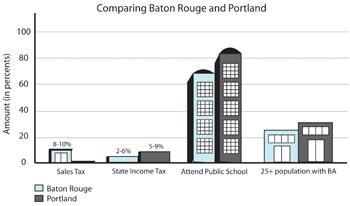Baton Rouge leaders are looking to Portland, Ore., for some inspiration on how to make the city better. A group of 150 Baton Rouge area leaders, including Chancellor Sean O’Keefe, traveled to Oregon for a four-day trip that concluded this past Wednesday. This is the fourth time Baton Rouge residents have visited other growing cities. This year, Portland was on the itinerary because of the city’s healthy economy, balanced transportation system, effective land-use policies and unique city planning. First-hand exposure to the model city provided participants with information they can apply to the Baton Rouge area. City planners set out to make Portland more environmentally friendly in 1968. Today, bicycle and walking paths border the streets, and efficient light rail commuter lines provide for convenient commuting. These developments helped alleviate traffic and pollution in the city. Portland has not always merited national distinction as a leading progressive city. According to the Baton Rouge Area Chamber’s workshop packet, the high-tech hub has experienced a significant shift. Once an industrial logging river city, the packet discussed challenges Portland faced such as racism, government corruption, high air pollution and transportation troubles. The Baton Rouge Area Chamber began its series of Canvas Workshop trips in 2003. Trips to Austin, Nashville and Raleigh-Durham served as learning opportunities. A substantial part of the region’s economic development today is attributed to these trips. One notable change since the first workshop in 2003 is the improvements in Baton Rouge’s research and development assets. Before the first workshop, Pennington Biomedical Research Center was in need of funds for world-class research. After the workshop, Pennington was able to obtain $25 million for a new clinical research building. Communication among the city’s civic and business leaders has also seen improvement as a result. Such networking relationships are crucial in Baton Rouge’s progression. The workshop packet outlined a number of topics. Issues that warranted greatest attention include diversity and tolerance, roads and infrastructure, workforce, business recruitment, higher education research and development, public education, quality of life, and community mindset. Chancellor Sean O’Keefe was among many University representatives to attend the workshop. O’Keefe said the workshop emphasized the critical role higher education and research institutions can play in city development. When the chamber asked the University to act as facilitator for open debate forums in the capital city, O’Keefe said he readily agreed. “There was a huge focus on why the University is so important,” he said. “The Baton Rouge Area Chamber is the first group to step forward and advocate legislature to support the University’s flagship agenda at the level of full formula funding.” O’Keefe said now is the time to support the University, and this recent legislature has done just that. He said the legislature has acted as a catalyst for moving the flagship agenda forward on the University, city and state economic development levels. “We were able to help support our advocates, our promoters with the government – basically our friends,” he said. Tackling different zoning approaches was another major point of discussion, according to O’Keefe. He said the University plans to host a forum for developers and city planners to discuss running light rail commuter lines for access through the regional community. O’Keefe said a third focal point involved promoting a stronger relationship with Southern University. Brooks Keel, vice chancellor for research and economic development, was also present at the workshop. Keel said he thought it was interesting that Portland did not have a major research university associated with it as Baton Rouge does with LSU. “Intel is a huge company in Portland,” he said. “They hire more than 16,000 employees and did it in a situation without a major research university.” Keel said it was a great opportunity for Baton Rouge community leaders to look at how other cities have dealt with issues ranging from transportation to housing. “Portland has done a marvelous job of establishing diverse housing options,” he said. “City planners took neighborhoods and designed them to incorporate lower and higher income families, multiple and single families and families of varying ethnicities.” Rachel DiResto, the Center for Planning Excellence vice president, said the trip was a great study on how land-use and transportation issues are integrated into one framework under Portland planning authorities. “Studying Portland is best to see how regional planning has made a huge difference in making the economy successful,” she said. “In the satellite city, Hillsboro, where Intel is located, light rail transportation is accessible. There is great attention to quality of space and quality of life.” Keel said he was impressed with the diverse backgrounds of the workshop’s attendants. Making up the group of Baton Rouge leaders were real estate agents, city government officials, city bankers, business owners, development planners, attorneys and many more. Each firm or organization provided the funds needed for their leaders to attend. “One thing we did take away from this trip is that Baton Rouge is unique,” he said. “Certainly not everything in Portland will apply to Baton Rouge, but I think we can learn from it.”
—-Contact Natalie Messina at nmessina@lsureveille.com
B.R. leaders learn from Portland workshop
October 3, 2007




